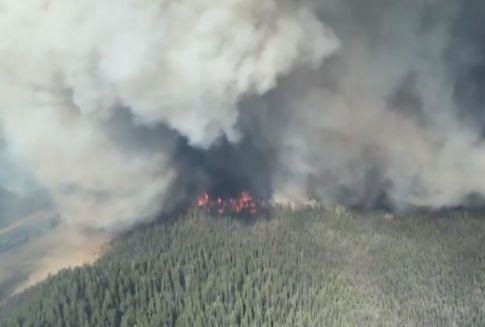Breaking
Wildfire forces about 2,000 people from homes in northern Alberta
WABASCA, Alberta — Wildfires have forced about 2,000 people from their homes in northern Alberta.
Cyndi Taron, director of emergency management with the Municipal District of Opportunity, said a state of emergency was put in place Sunday night for the area, 330 kilometres north of Edmonton.
About 1,000 residents of the hamlet of Wabasca and another 1,000 people from the surrounding Bigstone Cree Nation checked into reception centres in Calling Lake and Athabasca, she said. Others were staying with friends or gone elsewhere with campers and tents.
Mounties were going door-to-door in the communities and talked with some people who didn’t want to leave, she added.
“It’s mandatory but the RCMP do not have the authority to start dragging people out of their homes at this point,” Taron said Monday.
The out-of-control blaze first prompted an order to leave on Saturday, but residents were allowed to return that evening after it was contained. They were forced out again Sunday afternoon when wind pushed the flames past a fireguard.
“It just goes to show you how warm and dry it is out there,” said wildfire information officer Geoffrey Driscoll.
He said the fire, about two square kilometres or the size of 100 Canadian football fields, was one of 29 fires burning in the province on Monday.
Another blaze near Cold Lake caused Cenovus Energy and Canadian Natural Resources Ltd. to pull about 2,000 workers and shut down their oilsands operations Saturday. The closures have resulted in lost production of about 233,000 barrels of oil a day — roughly a 10 per cent loss of the province’s daily production of oilsands crude.
A small airplane used for fire suppression crashed while fighting that fire on Friday, killing a civilian pilot. Weather hampered efforts to get to the site and the body of 38-year-old William Alexander Garvie Hilts of Cranbrook, B.C. was recovered Monday.
The government also issued a provincewide fire ban Monday because of hot and dry weather conditions. Wildfire hazards were listed as high to extreme across most of the province.
The government said it’s the first full ban since 2011, when fire destroyed about one-third of the town of Slave Lake.
Some rural homes about 20 kilometres northeast of Slave Lake were evacuated later Monday but officials said the town was not in the path of the blaze.
And residents in a 30-kilometres radius around Mortonville in the Municipal District of Lesser Slave River were told to leave immediately on Monday.
Officials said they were to make their way to the MD office and hotel accommodations would be arranged.
“Our firefighters are starting to reach capacity,” said Driscoll. About 300 crew members are battling fires and an additional 1,000, including firefighters from Ontario, are ready to be called in to help.
Showers and thunderstorms were forecast in some areas for Monday night, and lightning could cause more fires, he said.
Firefighters were reporting good progress on fighting an out-of-control blaze northwest of Edson. That fire was about six square kilometres in size.






















